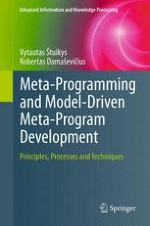2013 | OriginalPaper | Buchkapitel
11. Meta-Program Development as a Model Transformation Process
verfasst von : Prof. Vytautas Štuikys, Robertas Damaševičius
Erschienen in: Meta-Programming and Model-Driven Meta-Program Development
Verlag: Springer London
Aktivieren Sie unsere intelligente Suche, um passende Fachinhalte oder Patente zu finden.
Wählen Sie Textabschnitte aus um mit Künstlicher Intelligenz passenden Patente zu finden. powered by
Markieren Sie Textabschnitte, um KI-gestützt weitere passende Inhalte zu finden. powered by
